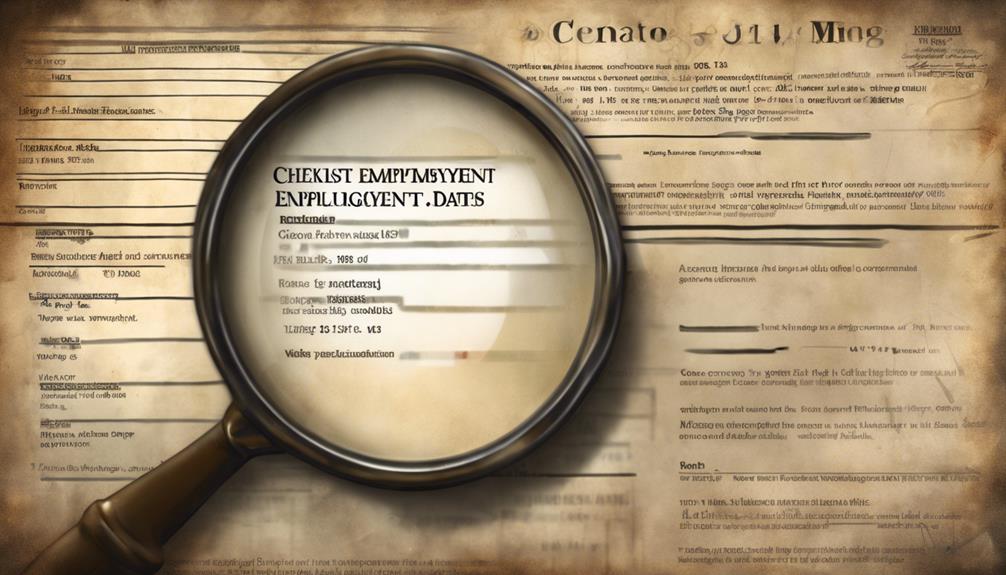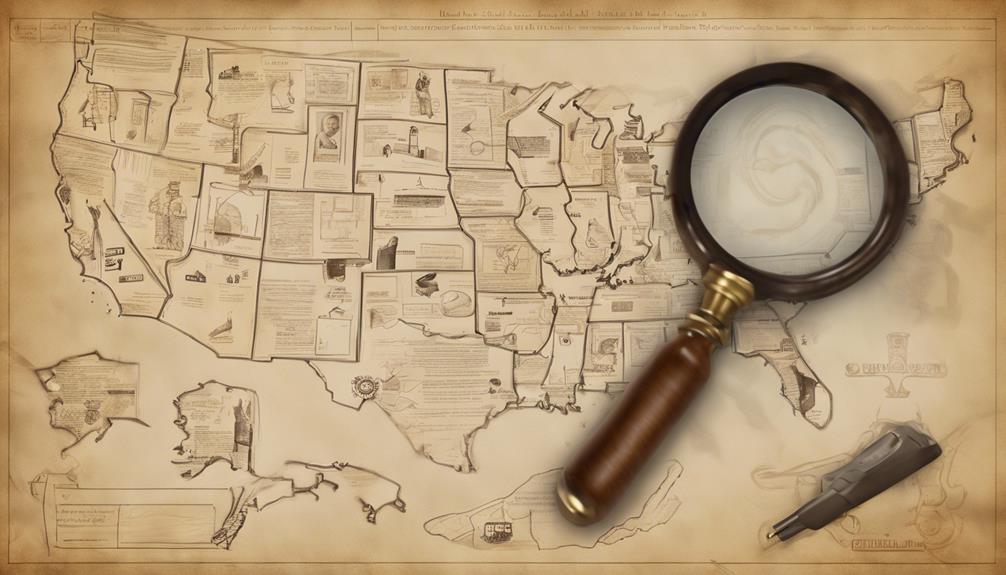Volunteer background checks are crucial for safeguarding organizations and individuals, reducing risks like child abuse and fraud. Federal laws like the FCRA and NCPA shape screening practices to guarantee safety and privacy. State laws complement federal regulations, covering criminal record access and retention. Various types of screening include identity verification and criminal background checks. Best practices involve utilizing reputable services and transparent processes. Programs offer tailored solutions for seamless background checks. Understanding these aspects is key to maintaining trust and security within volunteer activities. Additional insights await for a deeper understanding of this critical process.
Key Takeaways
- Ensure compliance with federal laws like FCRA and NCPA for thorough volunteer screening.
- Conduct identity verification, criminal background checks, and employment history verification.
- Utilize reputable background check services to maintain high standards of care.
- State laws complement federal regulations, covering record retention and criminal record access.
- Implement best practices like transparent screening processes to safeguard organizations and maintain trust.
Importance of Volunteer Background Checks

Volunteer background checks play an important role in safeguarding the integrity and security of organizations. Screening potential volunteers for any criminal background is necessary to guarantee the safety and well-being of all involved. By conducting thorough background checks, organizations can greatly reduce the risk of potential issues such as child abuse, fraud, or other criminal behaviors. This screening process helps organizations maintain a high standard of care and trustworthiness among their volunteers, which is crucial for upholding their reputation and protecting their assets.
Furthermore, volunteer background checks provide peace of mind for both the organization and the individuals they serve. Knowing that volunteers have undergone a screening process instills confidence in the community and helps to create a safe environment for everyone involved.
Federal Laws on Volunteer Screening
Federal laws play an essential role in shaping volunteer screening practices, ensuring organizations follow specific regulations. These laws include the Fair Credit Reporting Act, the National Child Protection Act, and the Volunteers for Children Act.
Understanding and complying with these federal regulations is vital for maintaining a balance between public safety and individual privacy in volunteer background checks.
Federal Screening Regulations
The Fair Credit Reporting Act (FCRA) ensures that volunteer background checks comply with federal regulations. Federal laws play a pivotal role in shaping the screening process for volunteers to guarantee the safety of vulnerable populations.
Here are some key points to take into account regarding federal screening regulations:
- National Background Checks: The National Child Protection Act (NCPA) allows organizations to access FBI criminal record files when conducting background checks on volunteers.
- Volunteers for Children Act: This act authorizes organizations to request federal criminal records as part of their background check policy for vetting individuals who work with children.
- Balancing Public Safety and Privacy: Federal laws aim to find a balance between public safety concerns and individual privacy rights when implementing volunteer screening processes.
While federal laws provide a framework for volunteer background checks, it's crucial to recognize that some states may lack specific regulations enabling access to federal criminal records for thorough screening.
Volunteer Screening Laws
When evaluating volunteer screening laws, it becomes evident that federal regulations set the foundation for ensuring compliance and safety in volunteer activities. The two key federal laws governing volunteer background checks are the Fair Credit Reporting Act (FCRA) and the National Child Protection Act (NCPA). The FCRA mandates that volunteer organizations follow specific guidelines when conducting background checks, ensuring fairness and accuracy in the screening process. On the other hand, the NCPA grants access to FBI criminal record files for thorough background checks.
To better understand the significance of federal laws in volunteer screening, let's explore them in a structured manner:
| Federal Laws | Description |
|---|---|
| FCRA | Mandates guidelines for fair and accurate volunteer background checks. |
| NCPA | Grants access to FBI criminal record files for in-depth volunteer screening. |
Compliance and Regulations
In ensuring compliance and upholding safety standards in volunteer activities, federal laws play an important role in regulating volunteer screening processes. When it comes to Volunteer Background Screening, understanding federal screening standards is essential. Here are some key points to keep in mind:
- The Fair Credit Reporting Act (FCRA) is a fundamental law that applies to volunteer background checks, ensuring organizations comply with federal screening standards and protect individual privacy rights.
- The National Child Protection Act (NCPA) grants access to FBI criminal record files for volunteer screening purposes, enhancing the thoroughness of background checks and safeguarding vulnerable populations.
- The Volunteers for Children Act empowers organizations to request federal criminal records for individuals volunteering with children or other at-risk groups, further enhancing public safety measures.
State Laws and Volunteer Screening

State laws play an important role in shaping volunteer screening processes, complementing federal regulations. These laws cover key aspects such as record retention, criminal record access, and principles like negligent hiring.
Understanding state laws is necessary to guarantee compliance, protect organizations, and maintain a safe environment for volunteers and those they serve.
State Laws Overview
Understanding the legal landscape surrounding volunteer screening is vital for organizations to comply with state laws and regulations. State laws complement federal regulations on volunteer screening, covering areas like invasion of privacy and defamation. They also regulate record retention and access to criminal records for volunteer screening purposes.
Some states have additional requirements for volunteer screenings, such as negligent hiring and breach of confidentiality. State laws provide guidelines for screening volunteers based on the state's specific legal framework. These laws play an essential role in shaping the volunteer screening process and ensuring the safety and security of organizations and the communities they serve.
Compliance Requirements
State laws regarding volunteer background checks play an important role in outlining compliance requirements for organizations conducting volunteer screenings. Compliance with these laws is essential to guarantee the safety and security of both volunteers and the organization. State regulations often include provisions on negligent hiring, breach of confidentiality, and additional screening requirements based on the volunteer's role. Understanding and adhering to state laws on volunteer screening is crucial for creating a safe and trustworthy environment for all involved.
| Compliance Requirements | |
|---|---|
| Key Areas Covered | Invasion of privacy, defamation, record retention, access to criminal records |
| Importance | Ensure legal compliance, safeguard volunteers and organization |
| Considerations | Negligent hiring, confidentiality breaches, role-specific screening |
Screening Process Guidelines
Effective volunteer screening processes are guided by specific state laws that dictate the procedures and requirements organizations must follow to guarantee adherence and safety.
State laws complement federal regulations by covering areas like invasion of privacy and defamation in volunteer background screening. They regulate record retention and access to criminal records, guaranteeing compliance and protection for organizations and volunteers.
Additionally, state laws include principles like negligent hiring and breach of confidentiality, establishing additional requirements for volunteer screening.
Moreover, state laws provide specific guidelines for screening volunteers based on the roles they'll perform within the organization.
Understanding state laws on volunteer screening is vital for organizations to ensure legal compliance and effective risk management. By adhering to these guidelines, organizations can create a safer environment for both volunteers and the communities they serve.
Types of Volunteer Screening
Volunteer screening encompasses various methods, including identity verification, criminal background checks, employment history verification, social media screening, and credit history and motor vehicle checks, to evaluate the suitability of potential volunteers for specific roles. Different volunteer roles may necessitate specific types of screening to guarantee they are appropriate for the position. Below is a table summarizing some common types of volunteer screening methods:
| Type of Screening | Description | Importance |
|---|---|---|
| Criminal Background Checks | Checks for any past criminal activities that could pose a risk to the organization or those served | Essential for ensuring the safety and security of all involved |
| Social Media Screening | Examines volunteers' online presence to assess their behavior and character | Helps in understanding the volunteer's public image and interactions |
| National Sex Offender Public Website | Searches for any history of sex offenses that could be concerning for certain roles | Critical for roles involving vulnerable populations |
Best Practices for Volunteer Screening

Implementing transparent and reliable screening processes is essential for safeguarding the safety and trust of both volunteers and the organization. When conducting volunteer screenings, organizations should consider the following best practices:
- Utilize reputable background check services:
Selecting trustworthy providers can offer more accurate and thorough information, aiding in effective volunteer screening processes.
- Invest in robust volunteer management software:
Implementing specialized software can streamline the screening process, making it easier to track background check statuses and ensure compliance with legal requirements.
- Communicate promptly with volunteers:
In cases of failed background checks, transparently informing volunteers can help maintain trust and mitigate potential risks to the organization.
Volunteer Screening Programs
Utilizing volunteer screening programs such as Direct Portal Entry and Keyed Applicant Request offers efficient solutions for organizations looking to streamline their volunteer screening processes. These volunteer screening platforms cater to the needs of volunteer organizations by providing tailored solutions to meet their standards effectively.
By allowing volunteers to input their information directly into the system for background checks, Keyed Applicant Request simplifies the screening process and ensures adherence with federal, state, and local regulations.
Moreover, these volunteer screening programs are particularly beneficial for large organizations, enabling them to manage a high volume of volunteers while pinpointing any red flags in their criminal records efficiently. By incorporating flexible volunteer screening solutions, these programs not only enhance operational efficiency but also provide a thorough approach to screening potential volunteers for any volunteer program.
This proactive approach helps organizations maintain a safe and trustworthy environment for both volunteers and the communities they serve.
Frequently Asked Questions
How Should I Prepare for a Background Check?
When preparing for a background check, an individual should gather personal information like full name, date of birth, and Social Security number. They need to be ready with details on previous addresses, work history, and education.
Why Are Background Checks Important for Volunteers?
Ensuring safety and trust in volunteer programs, background checks are crucial. They safeguard vulnerable individuals and uphold legal standards. For instance, a thorough check uncovered a volunteer's criminal record, preventing potential harm and maintaining community well-being.
What Factors Should Be Considered When Conducting a Background Check?
When conducting a background check, organizations should consider the volunteer's role, compliance of screening service providers, cost coverage, additional checks needed, and alignment with policies. These factors guarantee thorough vetting of volunteers.
What Matters Most in a Background Check?
When conducting a background check, what matters most is the thorough examination of criminal history, sex offender registry, and driving record. Employers prioritize accurate information for safety. Transparency and clear communication guarantee an effective screening process.
Conclusion
To sum up, volunteer background checks are essential to ensuring the safety and security of organizations and the communities they serve.
For instance, a youth sports organization implemented thorough volunteer screening procedures and discovered a potential coach had a criminal record for child endangerment. Thanks to the background check, the organization was able to prevent a potentially risky situation and protect the young athletes in their care.
Keep in mind, detailed screening is vital to a successful volunteer program.









